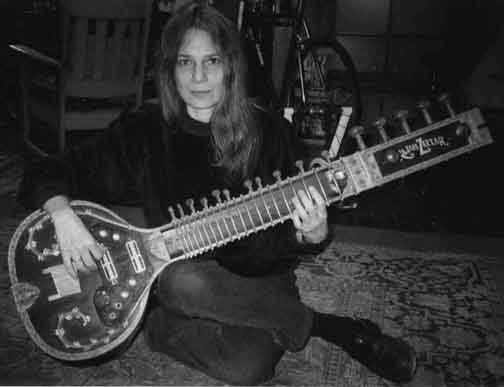 |
Laurie Spiegel | ||
| Spiegel was born in Chicago where in her teens she played guitar, banjo, and mandolin, and through them cultivated a devout philosophy of amateur music making. After receiving a degree in the social sciences, she returned to music. Having taught herself notation, she studied classic guitar and composition privately in London, then baroque and renaissance lute at Julliard, and composition with Jacob Druckman and Vincent Persichetti. | |||
| Laurie Spiegel is one of those rare composers in whom head and heart, left brain and right brain, logic and intuition, merge and even exchange roles. Though she is one of the highest-tech computer composers in America, Spiegel is also a lutenist and banjo player, and sees the computer as a new kind of folk instrument. She makes her most intuitive-sounding and melodic music from mathematical algorithms, and her most complex computerized textures by ear and in search of a desired mood. Form and emotion are as difficult to separate in her music as they are in that of her idol, J.S. Bach. | |||
| Despite her innovative involvement with technology, Spiegel the composer has never been dominated by Spiegel the computer technician. Her music from the 70s used compositional algorithms (in one case a realization of Kepler's "Harmony of the Planets", included in the Voyager spacecraft's record Sounds of Earth) to generate music in an accessible, minimalist vein. Some of that music was captured on her record on the Philo label, The Expanding Universe, containing works from 1974-6. But in the early 80s, Spiegel distanced herself from the downtown New York scene that she had helped create, complaining that the new music scene's general direction was toward an "expansion of the collection of tools and techniques available to make music (useful, but not as the central content of a work)". "For me," she more recently explained, "music is a way to deal with the extreme intensity of moment to moment conscious existence." Since breaking away, Spiegel has lived as one of New York's most independent musicians, supporting herself by her software and circulating her music privately. Those who fell in love with the folklike melodies and early algorithms of The Expanding Universe may be surprised to hear how much darker and more complex Spiegel's recent music has become. "Minimalism" may still aptly describe the slow movement of pitch in these pieces (Unseen Worlds), but it gives no hint of their complex timbres, glacial momentum, and cathartic climaxes. Such vibrant, expressive music could only have come from a composer who put her intuition and imagination first, yet who had the immense technical know-how needed to meet the challenges they posed. Notes by Kyle Gann for Unseen Worlds | |||
| http://retiary.org/ls/ | |||
| Articles | |||
| Interview on Tokafi | |||
| Interview on radiom | |||
| List of Works | |||
| List of Works | |||
![[ Vox Novus logo ]](http://www.voxnovus.com/img/Vox_Novus_logo.jpg)
![[ Vox Novus - the new voice for contemporary music ]](http://www.voxnovus.com/img/Vox_Novus.jpg)